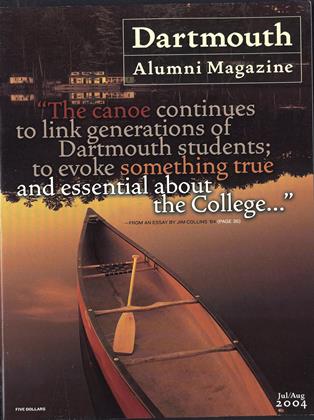WITH THE RECENT ATTENTION PAID to views of Mars being transmitted back to earth by rovers Opportunity and Spirit, more people are giving serious rather than whimsical consideration to the possibility of life on the red planet. We asked faculty members with different interests what impact such a discovery might have on their respective fields:
Laurence Davies, English: "In one sense [a discovery would not change things] very much, in one sense hugely—because of the response to all the philosophical and religious questions about life in the universe and how widespread or rare it is."
Mark Williams, film and TV studies: "Possibly a renewed interest in movies and TV shows ranging from the comic banality of My Favorite Martian to the metaphor of red-scare politics in RedPlanet Mars"
Ronald M. Green, religion and ethics: "Ethically, it would raise questions about how can we avoid contaminating the Mars environment and how can we avoid bringing back things that will contaminate our own environment."
Thomas Luxon, English: "Many would be prompted to re-read books like C.S. Lewis' Out of the Silent Planet, as well as critical comparisons between what authors like Lewis imagined life on Mars to be like and what scientists tell us conditions would have allowed."
John Winn, chemistry: "It wouldn't change any existing views in chemistry but I'm sure it would ignite some new directions for research, much as the discovery of the ozone hole over Antarctica or similar wide-impact surprise discoveries have done."
Jim Moor, philosophy: "What is interesting philosophically is the possibility of expanding the definition of life. This would offer the possibilities of life forms made up of different kinds of materials and functioning in different ways than they do on Earth. It would expand who we think we are."
John Thorstensen, physics and astronomy: "It would be great because it would create quite a lot of interest and get people interested in things beyond the Earth. On the other hand, it might also accelerate the rush to put a person on Mars, which I think is something of a misguided effort at this point."
Jeremy Rutter, archaeology: "If it was a sentient life form, it would revolutionize our thinking about time depth. You can only take history back about 5,000 years and then it disappears. But you can take archaeology back much further." Richard Kremer, history: "Wed go back and revisit earlier discussions [about people such as] the American astronomer Percival Lowell. He was just a Mars fanatic. With his telescope he looked at Mars and thought he saw signs of canals and streets and cities that he actually identified."
Edward Berger, biological sciences: "If there are primitive organisms that are based on the same chemistry as life on earth, we would recognize that we are not alone and the chance of encountering life else-where in the universe is very close to 100 percent. The mind blower would be to discover a life form based on a different chemistry, say silicon rather than carbon."
 View Full Issue
View Full Issue
More From This Issue
-
 Cover Story
Cover StoryCanoes Undying
July | August 2004 By JIM COLLINS ’84 -
 Feature
FeatureShoot to Thrill
July | August 2004 By DAVID MCKAY WILSON -
 Feature
FeatureUnderstanding Failure
July | August 2004 By JULIE SLOANE ’99 -
 Feature
FeatureOn The Water
July | August 2004 By JIM COLLINS '84 -
 Faculty Opinion
Faculty OpinionTrade, Jobs and Politics
July | August 2004 By Douglas A. Irwin -
 Sports
SportsYouth at Risk
July | August 2004 By Irene M. Wielawski
Bonnie Barber
-
 Article
ArticleClass of 1993
May/June 2005 By Bonnie Barber -
 Article
ArticleNewsmakers
Sept/Oct 2005 By BONNIE BARBER -
 Article
ArticleClass of 1981
Jan/Feb 2009 By Bonnie Barber -
 SEEN AND HEARD
SEEN AND HEARDNewsmakers
Mar/Apr 2011 By BONNIE BARBER -
 SEEN AND HEARD
SEEN AND HEARDNewsmakers
May/June 2013 By BONNIE BARBER -
 Article
ArticleRare Earth
MAY | JUNE 2014 By Bonnie Barber
Article
-
 Article
ArticleDartmouth Night
January 1936 -
 Article
ArticleAcademic Delegates
May 1954 -
 Article
ArticleCHEMISTRY FELLOWSHIP
DECEMBER 1963 -
 Article
ArticleFund Director
OCT. 1977 -
 Article
ArticleDARTMOUTH OUT OF DOORS IN THE EIGHTIES DARTMOUTH OUT OF DOORS IN THE EIGHTIES
January 1924 By Charles Sumner Cook '79 -
 Article
ArticleTHE GENERAL ASPECT
DECEMBER 1929 By Professor Edwin J. Bartlett

